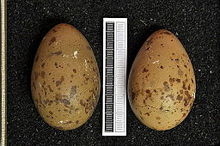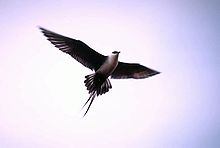| Long-tailed jaeger | |
|---|---|

| |
| Conservation status | |
 Least Concern (IUCN 3.1) | |
| Scientific classification | |
| Domain: | Eukaryota |
| Kingdom: | Animalia |
| Phylum: | Chordata |
| Class: | Aves |
| Order: | Charadriiformes |
| Family: | Stercorariidae |
| Genus: | Stercorarius |
| Species: | S. longicaudus |
| Binomial name | |
| Stercorarius longicaudus Vieillot, 1819 | |

| |
The long-tailed skua or long-tailed jaeger (Stercorarius longicaudus) is a seabird in the skua family Stercorariidae.
Etymology
The word "jaeger" is derived from the German word Jäger, meaning "hunter". The English word "skua" comes from the Faroese name skúgvur [ˈskɪkvʊər] for the great skua, with the island of Skúvoy known for its colony of that bird. The general Faroese term for skuas is kjógvi [ˈtʃɛkvə]. The genus name Stercorarius is Latin and means "of dung"; the food disgorged by other birds when pursued by skuas was once thought to be excrement. The specific longicaudus is from Latin longus, "long", and cauda, "tail".

Description

This species is unmistakable as an adult, with grey back, dark primary wing feathers without a white "flash", black cap and very long tail. Adults often hover over their breeding territories. Juveniles are much more problematic, and are difficult to separate from parasitic jaeger over the sea. They are slimmer, longer-winged and more tern-like than that species, but show the same wide range of plumage variation. However, they are usually colder toned than Arctic, with greyer shades, rather than brown.
This is the smallest of the skua family at 38–58 cm (15–23 in), depending on season and age. However up to 29 cm (11 in) of its length can be made up by the tail which may include the 15 cm (5.9 in) tail streamers of the summer adult. The wingspan of this species ranges from 102 to 117 cm (40 to 46 in) and the body mass is 230–444 g (8.1–15.7 oz).
Subspecies
Two subspecies are described:
- S. l. longicaudus – Vieillot, 1819: nominate, found in northern Scandinavia and Russia.
- S. l. pallescens – Løppenthin, 1932: found in eastern Siberia, Arctic North America, and Greenland.
Breeding

This species breeds in the high Arctic of Eurasia and North America, with major populations in Russia, Alaska and Canada and smaller populations around the rest of the Arctic. It is a migrant, wintering in the south Atlantic and Pacific. Passage juvenile birds sometimes hunt small prey in ploughed fields or golf-courses, and are typically quite fearless of humans.
They nest on dry tundra or higher fells laying two spotted olive-brown eggs. On the breeding grounds they can be heard making yelping and rattling sounds. Outside of the breeding season they spend most of their time over open ocean and have a harsh kreeah cry. This bird feeds on fish (mainly caught from other seabirds), smaller birds, food scraps, small mammals, fruit and carrion. On migration, long-tailed jaegers are more likely to catch their own food, and less likely to steal from gulls and terns than larger species.
References
- BirdLife International (2018). "Stercorarius longicaudus". IUCN Red List of Threatened Species. 2018: e.T22694251A132536719. doi:10.2305/IUCN.UK.2018-2.RLTS.T22694251A132536719.en. Retrieved 13 November 2021.
- "Jaeger". Oxford English Dictionary (Online ed.). Oxford University Press. (Subscription or participating institution membership required.)
- "Skua". Oxford English Dictionary (Online ed.). Oxford University Press. (Subscription or participating institution membership required.)
- Jobling, James A (2010). The Helm Dictionary of Scientific Bird Names. London: Christopher Helm. pp. 229, 365. ISBN 978-1-4081-2501-4.
- Dunning, John B. Jr., ed. (1992). CRC Handbook of Avian Body Masses. CRC Press. ISBN 978-0-8493-4258-5.
- "Long-tailed jaeger videos, photos and facts - Stercorarius longicaudus". ARKive. Archived from the original on 2011-10-29. Retrieved 20 October 2011.
- Gill, F.; Donsker, D.; Rasmussen, Pamela, eds. (2021). "Noddies, gulls, terns, skimmers, skuas, auks". IOC World Bird List (V. 11.1). doi:10.14344/IOC.ML.11.1.
External links
- Long-tailed jaeger photos at Oiseaux.net
- BirdLife species factsheet for Stercorarius longicaudus
- "Stercorarius longicaudus". Avibase.

- "Long-tailed jaeger media". Internet Bird Collection.
- Long-tailed jaeger photo gallery at VIREO (Drexel University)
- Interactive range map of Stercorarius longicaudus at IUCN Red List maps
- Audio recordings of Long-tailed jaeger on Xeno-canto.
- Stercorarius longicaudus in Field Guide: Birds of the World on Flickr